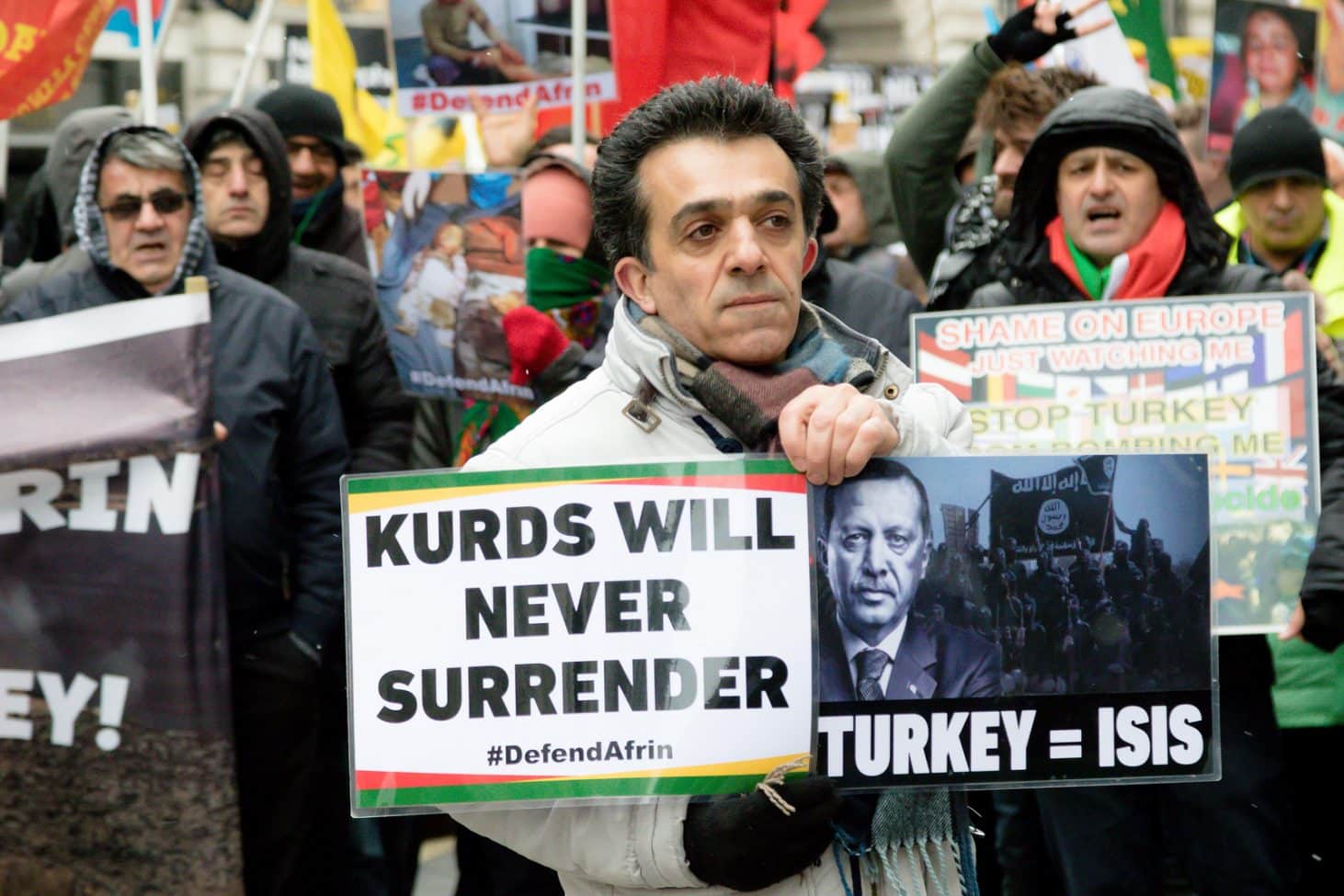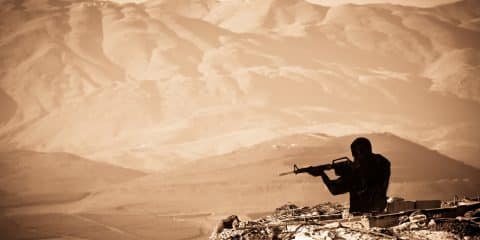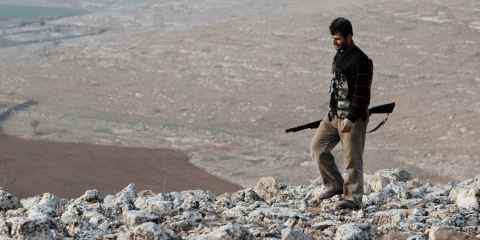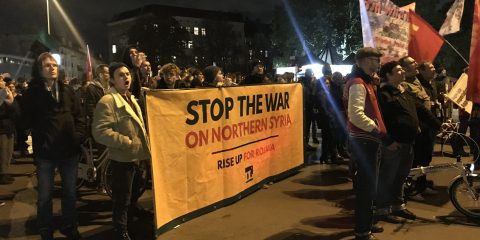President Erdogan is taking Turkey in dangerous directions. The conquest of the Kurdish ‘Afrin enclave lends momentum to his ambitions. Erdogan must pay a manifest price for leading Turkey towards dictatorship and Islamism.
On January 21, the Turkish military, aided by Syrian Jihadi allies (masquerading as the FSA) launched a campaign for the conquest of the Kurdish enclave of ‘Afrin, in northwestern Syria. Originally scheduled to take days, it took nearly two months. The advance was slow, at times clearly inept, but nevertheless relentless, and it had a terrifying human cost. Russia, despite good relations with the Kurds, gave her blessing. The US openly accepted that the Turks have legitimate security concerns. ‘Afrin has now fallen, and the Turks have inflicted a painful humiliation upon the proud Kurdish fighting forces.
This is a problematic outcome, and not only for moral reasons. The US, Israel in her own way, and others in the region and beyond it, owe the Kurds of Rojava (their name for the Kurdish areas of northern Syria) a debt. They were the ones, men and women, who stood their ground at Kobani, and broke the myth of ISIS invincibility. Their contribution now, and in the foreseeable future, could be equally or even more important. They are now, in the ranks of the Syrian Democratic Forces, a key presence in eastern and northeastern Syria, helping the US fend off both ISIS and Iran’s forces and proxies. The future of the region requires a strong and confident presence of the SDF in large parts of eastern and northern Syria. The alternative is a political landscape totally dominated by IS and its likes on one hand, and by the Iranian regime and its proxies on the other. Hence the US announcement in January that the SDF will form a “Border Security Force” in eastern Syria.
It is in defense of the SDF position that the US deployed fighting forces in eastern Syria. This is why they used such a remarkable display of firepower in the February 8 battle for the bridges near Deir a-Zor, killing many Iranian proxies and regime troops (as well as at least 15 Russian mercenaries). The Turkish crushing of resistance in ‘Afrin – and now, the possible spread of the fighting to Manbij and beyond – would put at risk the residual ability of Rojava Kurds in general to look upon their erstwhile US allies with any degree of trust. Their confidence in the alliance is already sorely tested, and the overall lessons for the region are sad and frightening. With an existential Turkish threat looming over their heads, the Kurds cannot be asked for much longer to stay focused on their present missions.
Moreover, the costly victory at ‘Afrin may further fan the flames of Erdogan’s apparently imperial ambitions and his obsessive Islamist agenda. Reportedly, the AKP government now plans to introduce the study of Jihad as a value in schools. This is one more indication that Erdogan, driven by a deep ideological commitment, is taking his country on what is bound to become a collision course with the norms, ideals and interests of his NATO allies.
Democratic rights and freedoms in Turkey are being systematically eroded, and hundreds have been arrested for criticizing “Operation Olive Branch.”The purges against “Gulenists” continue apace. (The damage done to the capacity of the Turkish armed forces, after the failed 2016 coup d’etat, may have been reflected in the relatively poor military performance in ‘Afrin).
Turkey also harbors Hamas terrorist infrastructures; meddles (with Qatar’s active help) in the internal affairs of countries across the region, particularly Libya and Egypt; and seeks to undermine the Israeli position in Jerusalem. A Turkish base has emerged in Qatar and a naval dock is to be built in Sudan. As an act of defiance towards the Western alliance, and perhaps a reflection of his fears and mistrust, Erdogan has chosen to buy and deploy (by 2019) the advanced Russian S-400 surface-to-air missile system.
Does all of this already signify that Turkey has irretrievably “sailed east”, reversing the Kemalist western – and secularist – orientation?
Not necessarily. There are still considerable forces and considerations, political, economic, social and cultural, which could pull or push back. Even AK is not of one cloth on all these matters. But if Erdogan is to be prevailed upon to change course, there must be a well-established sense that the costs of his present policies are beginning to rise steeply.
The time for action is now. It is too late to save ‘Afrin: but there is still a prospect of preventing Turkish operations from spreading further, to Manbij and other parts of Rojava. This would largely depend upon the effective response of the Trump Administration and of other NATO allies to the situation now unfolding in northern Syria.
Back in September 2016, it still made sense for Secretary of State John Kerry to suggest a compromise. The Kurdish enclaves west of the Euphrates river would not seek integration in the emerging SDF zone of control – leaving Erdogan free to exercise his influence there – while east of the river would become an effectively autonomous Kurdish land.
But what made sense then does not make sense now. Too much has changed – both on the ground in Syria, where the SDF is now a vital last hold of US influence and leverage; and in Ankara, where policies are increasingly driven by Erdogan’s sense of international impunity.
There are ways of delivering a blunt and unambiguous message to Erdogan. The F-35 deal should be put on hold, and Congress would do well to initiate hearings on Turkey’s conduct, including the fighting against US allies in northern Syria and the S-400 acquisition from Russia.
As for NATO, there are no provisions in the Treaty’s statutes for the removal of a member state. But surely there are ways to generate a variable architecture in which not everyone gets into every room. A country whose secret services long played a double game with ISIL, and still harbor active Hamas infrastructures, cannot have free access to all that the alliance has to offer.
The re-configured leadership team in Washington should be well-placed to read the riot act to Erdogan – backed by bipartisan Congressional action. (Pro-Israeli and pro-Greek forces in the US can be of help). True, the timing may prove to be awkward. It is not easy to undertake firm measures to restrain Turkey, while at the same time moving to nix (and then re-fix?) the JCPOA. It is of vital importance, however, for the US to be seen first and foremost as loyal to those among her friends who are willing to fight off the Islamists, of all hues and types. This will have a general salutary effect across the region.
On the other hand, an American attempt to use Erdogan to “balance” Iran will in all likelihood bring about the opposite result. Based on past experience, it is safe to assume that Erdogan and Hakan Fidan will surely play a double game, courting both sides and avoiding any real action in eastern Syria against Iran. His interests are in the north: the Kurds will remain vital for the outcome in the east, to thwart Iran’s “land bridge” to the Mediterranean. Helping them would be the best way to re-assert American authority in an increasingly troubled region.
As for the economic dimension, it will not be easy to generate effective leverage. Turkey’s trading partners in Europe are painfully aware that Erdogan holds over their heads the threat of inundation by millions of refugees now stranded on Turkish soil. It is dangerous to confront him. Erdogan has leverage on some of the Turkish minorities in key European countries.
Still, even in the absence of formal sanctions, an increasingly hostile public discourse in Western countries towards Turkey may begin to raise questions – particularly in opposition strongholds, in the areas of Turkey more open to the world – about the costs and viability of present policies.
AKP rose to power, and has been able to hold to it, largely due to the opportunity it gave to many among the poor to move up from the shantytowns and the countryside to the ranks of the urban lower middle class. Hence Erdogan’s reluctance (as Israel has discovered) to risk harm to foreign trade relationships. This reluctance can be used as a lever.
In sum, Turkey has become a highly problematic member of NATO. Democratic rights are steadily eroding, and Erdogan has acted to destroy important American allies. He also harbors terrorists, and seeks to introduce the value of Jihad into school curricula. By 2019, his country will be deploying advanced Russian-made air defense systems.
There must be a manifest price for taking Turkey down this path. Pressure can and should be brought to bear on Erdogan, above all by the new leadership team in the US, and this should be backed up by Congressional action. Israel’s friends should be ready to lend their support, if asked for their opinion.
The first concrete goal for the US and the West should be to curb the spread of the military campaign against the YPG/SDF (while also engaging with the Kurds in Manbij to achieve a modus vivendi and prevent further escalation). Beyond that, Erdogan should be made aware that the coming US confrontation with Iran does not give him a free hand to pursue his own variant of a totalitarian Islamist agenda.
JISS Policy Papers are published through the generosity of the Greg Rosshandler Family.
photo:









 - בניית אתרים
- בניית אתרים